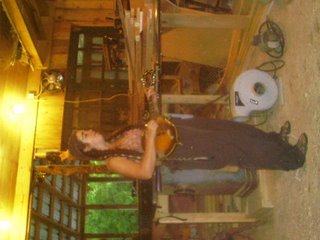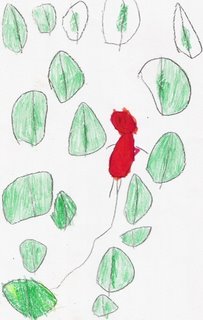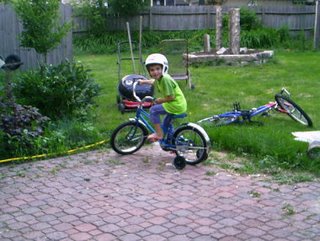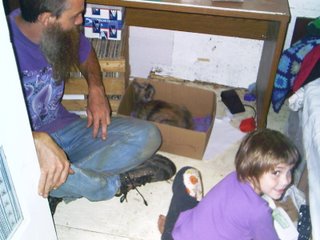Dealing with Mo in social situations has really forced me to think about rewards and punishments from a different angle. Generally, when adults speak to Mo she looks away, hides her face and refuses to answer. The usual responses to this kind of behavior have always seemed very punitive to me - I was "the shy kid", and I definately felt punished, shamed, by the condescending "oh, she's just shy" comments. Even worse were the attempts to "draw me out" - those were like some kind of torture. On top of it all, the constant reinforcement of my in-ability prevented me from actually learning social skills. It was only living in community that I discovered that I was not "socially backward" and started to grow. So when Mo started showing signs of the same sorts of tendency, I struggled to find a different way of reacting.
The first time I read The Montessori Method I knew I had found what I was looking for. Scanning my marginal notes in chapter 5 I find a big YES! scrawled next to this passage:
The child, because of the peculiar characteristics of helplessness with which he is born, and because of his qualities as a social individual is circumscribed by bonds which limit his activity.
An educational method that shall have liberty as its basis must intervene to help the child to a conquest of these various obstacles. In other words, his training must be such as shall help him to diminish, in a rational manner, the social bonds which limit his activity.
Little by little, as the child grows in such an atmosphere, his spontaneous manifestations will become more clear, with the clearness of truth, revealing his nature. For all these reasons, the first form of educational intervention must tend to lead the child toward independence.
From:
The Montessori Method (1912) by Maria Montessori, translated by Anne Everett George. New York: Frederick A. Stokes Company, 1912. pp.95.
http://digital.library.upenn.edu/women/montessori/method/method-V.htmlThis describes so well my experience. With Mo I have been working to do as Dr Montessori suggests - to lead her toward independence, rather than demanding performance and shackling her with "social bonds". Below are a couple of anecdotes that I hope will demonstrate how this looks in real life.
The other day our new neighbor came by to introduce himself and while chatting he asked Morgan a question. I don't recall the precise question, only that it was atypically respectful for an adult speaking to a young child - for example, "how do you like living here?" as opposed to "how old are you?". Morgan looked away and didn't answer. Generally in this sort of situation I would wait a moment -long enough for her to answer if she chose, but not too long - and then return to the conversation or change the subject. No explanation to the other adult - because I remember what those explanations "felt like" hearing them as a child. What impressed me about this gentleman was his reaction: he imediately appologized to Mo in the most natural way possible, saying: "I didn't mean to put you on the spot there, you don't have to answer me." It was exactly the kind of thing one would say to another adult if one suddenly realized one had asked a rather inappropriate question. We (adults) returned to our conversation. Less than five minutes later Morgan had become a part of the conversation, too, in such a seamless and natural way that I can't even remember the details. She joined the conversation the way anyone would - a word here, a comment there, until we were all chatting away merrily. Given the liberty to behave normally, rather than being shamed for how "abnormal" her reaction was, she was able to express a "spontaneous manifestation" of the propper social forms.
A few days later an incident occured in the library that sharply contrasted, for me, the difference between the Montessori ideal and "traditional" education.
Morgan was sitting in the young-childrens' section of the library looking at books when another child approached. This girl was perhaps a year or two older, and clearly a school-child. What struck me most was her furtiveness. She practically snuck up to Mo, glanced at her out of the corner of her eyes but sat down within touching distance. Mo imediately looked up and said "Hi, my name is Morgan. Would you like to look at some books with me?" Picture-perfect friendly social behavior (and in the appropriate low tones for a library, this mom was very impressed!). The other girl responded tentatively and with a minute the two were chatting quietly about books and characters, reading passages to each other - you couldn't have imagined a better example of how we would all like children to behave with regard to reading.
Suddenly the girl's mother swooped down: "What are you doing here? These books are for babies! Stop talking and go pick out a book from the big-kid section!" The child slunk away, head down, her joy in the library diminished. It was shocking. I'm sure the other mom had the best intentions in the world, but she had not observed the girls' interaction and saw only misbehavior, which she corrected sharply.
It got me thinking about the word homeschoolers usually flinch at: socialization. The girl was being "socialized" by certain standards. She had been told to pick out a book, so spontaneous social activity was inadmissible. It didn't matter that she was socializing about literature - probably the other parent would not have believed such a thing possible. Children socialize about games and toys, not books and reading - they have to be "taught" to discuss literature, they certainly don't do it spontaneously (the common wisdom). Since Morgan is not being socialized in this manner she is Free to develop genuine relationships on a wide variety of topics. Because she was surrounded by books, it was natural for her to engage in a discussion of childrens' literature with another person. It would not have occurred to her to discuss her favorite toy in such an environment - to her it would have seemed inappropriate.
Morgan has the libery to behave spontaneously in social situations, and as Montessori describes above, I am slowly seeing her social behavior become "clear, with the clearness of truth." She is increasingly aware of social forms and conventions, as I hope these examples also show, but she is unhampered by restrictions or punishments. Its inspiring just watching her sometimes!
---Meredith (Morgan 4.5)
 Here's Morgan having a grand old time with her new "chemistry" set. Most of the "experiments" involved polymers that expanded in some fashion with the addition of water, some quickly, some slowly. The results looked like snow, jello, and less describable goos.
Here's Morgan having a grand old time with her new "chemistry" set. Most of the "experiments" involved polymers that expanded in some fashion with the addition of water, some quickly, some slowly. The results looked like snow, jello, and less describable goos.





























